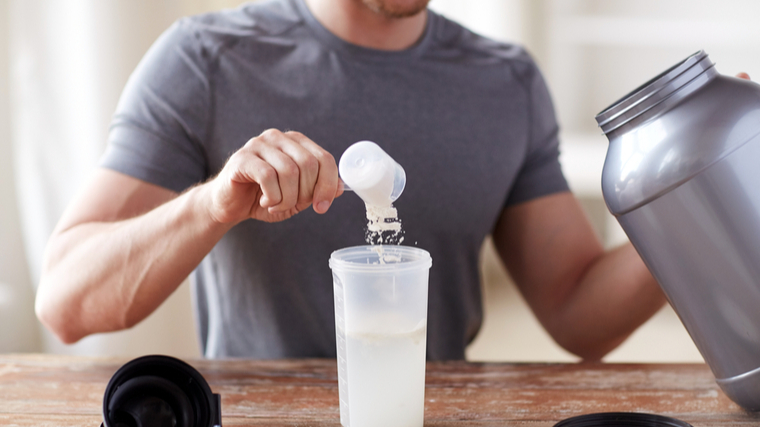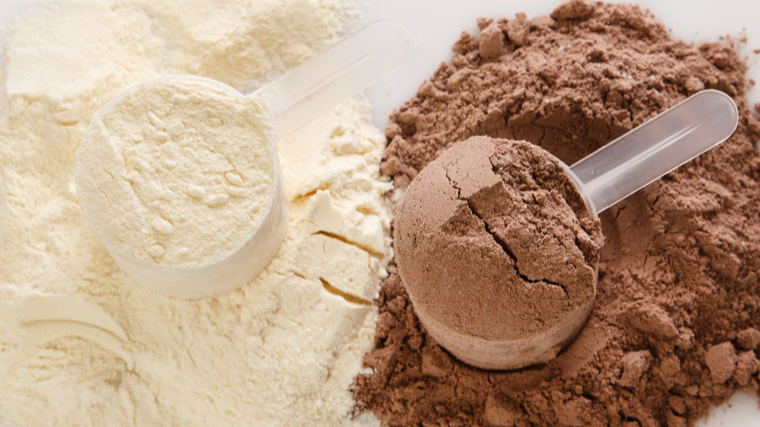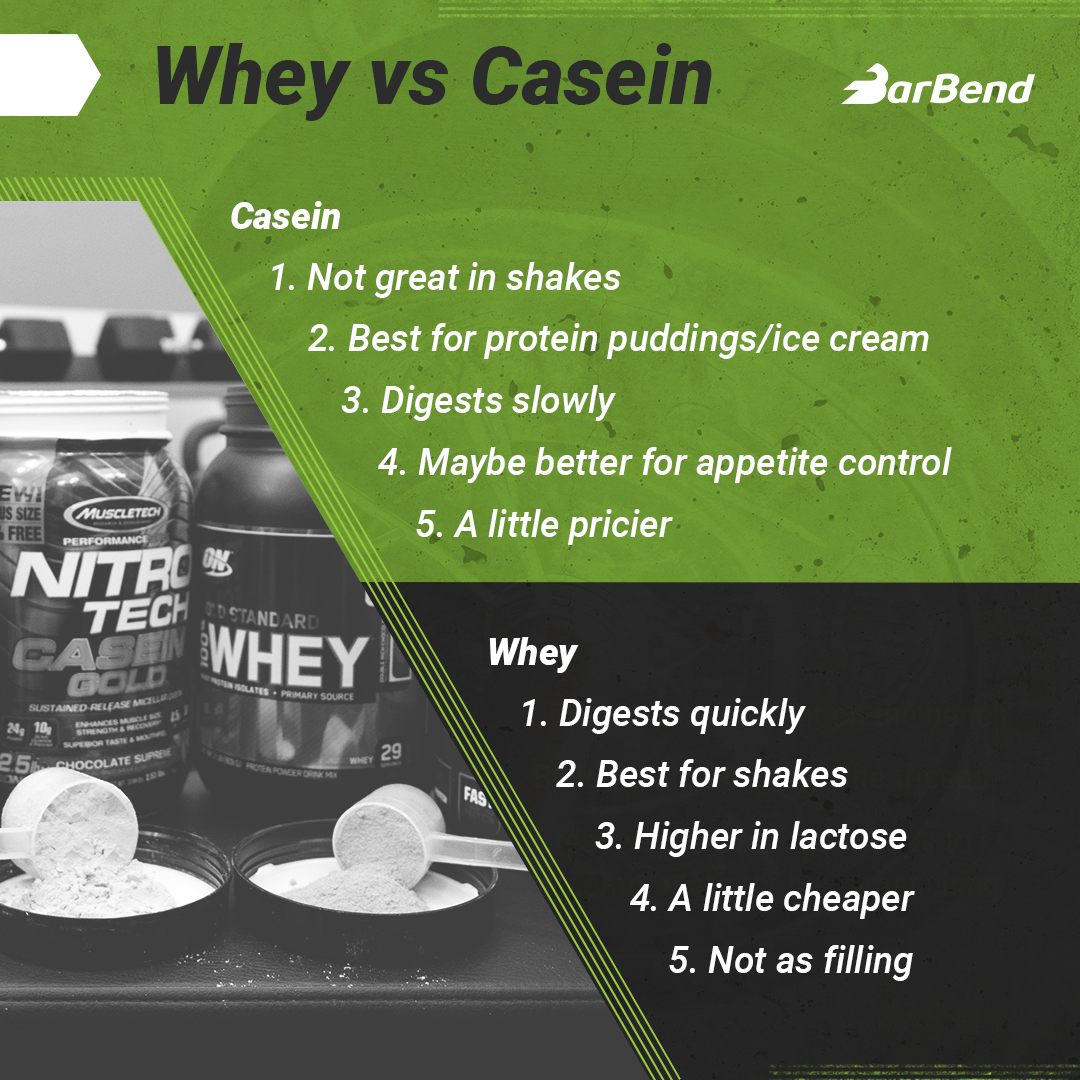There’s no avoiding passionate debates in the fitness world, whether that’s free weights vs. machines, high-volume vs. low-volume, or pro-carbs vs. anti-carbs. And then there’s whey protein vs. casein protein — which one should lifters take to help muscle and strength gains?
You might think the clear winner is whey, as it’s the more popular variety, but casein has many redeeming qualities that make it a great choice for a post-workout shake. So is whey the way, or should lifters be looking at casein to help supplement their gains?
We’re going to dive into the differences between whey and casein protein and discuss the benefits each has on strength, health, and muscle, as well as which one might be the best for you to pick up at your favorite supplement store.
- What is Protein Powder
- Benefits of Whey Protein
- Benefits of Casein Protein
- Whey vs. Casein Compared
- Which Protein is Right For You
- Frequently Asked Questions
What is Protein Powder?
Protein powder is arguably the oldest supplement on the market. Protein is the main building block of all muscle, so you want to make sure you’re getting as much of it as possible. But eating it in the form of whole foods may be difficult if you’re looking to ingest a ton of calories a day — so taking it in powder form can make it easier to get the proper amount.
Protein powder actually comes in many forms — from whey and casein to pea and soy. These two protein sources are animal-based, as they mostly come from cow milk (some specialty brands even use more exotic sources like goat milk.)
[Related: The Real Pros and Cons of Mass Gainers]
The whey created by the separation process has the most carbs and fat. You can process that into the pricier and almost carb- and fat-free whey isolate, or you can process it even more and make it even more expensive with hydrolyzed whey, which could be considered partially digested or broken down, so it digests a little faster.
Casein is processed differently and retains a different physical structure throughout. In practical terms, it doesn’t break down as finely as whey isolate, which is the principal factor behind its relatively slower digestion time. (1) (2)
Benefits of Whey Protein
Besides being a cheap, plentiful protein source, whey has a number of benefits for strength, muscle, and overall health. To start off, whey protein supplementation has been proven to enhance an all-body anabolic state — or promote muscle growth in all muscles. It’s also been shown to help recovery following intense resistance training sessions. (3)
Speaking of recovery, whey protein supplementation has also been shown to reduce key markers of inflammation — which can cause muscle soreness and other health hazards such as fevers. And because whey protein is chock full of antioxidants, it can protect against oxidative stress, which can cause muscle tissue damage if left untreated. (4) (5)

While it’s primarily associated with gaining weight, protein powder can be equally as effective in helping you lose fat. Since protein is the most satiating macronutrient, meaning it helps you feel more full compared to carbohydrates and fats, whey protein supplementation can help you stave off hunger pains and hold on to your hard-earned muscle even while in a caloric deficit., so long as you’re hitting your protein goals. (6) (7)
There are other claims that whey protein can treat conditions ranging from bowel diseases, type 2 diabetes, and even help lower your blood pressure — though similar results were found with casein protein, pointing to the dairy content possibly being the benefactor instead of the whey itself. (8) (9) (10)
Benefits of Casein Protein
Casein, though sometimes more expensive than whey, has multiple exclusive benefits that make it an excellent choice for anyone looking to increase their protein intake. For one, it’s been known to have bioactive compounds not found in other protein sources that can help improve gut health or digestion. (11)
And we already mentioned one of the biggest benefits: casein’s slow digestion rate. Whey protein gets absorbed by the muscles and cells much quicker than casein, leading to faster protein synthesis and other bodily actions. Casein takes a little bit longer to fully penetrate the muscles and cells.
This means you can take a scoop of casein and not have to worry about refeeding yourself for quite some time because the protein will still be in your system. This why many people take casein before bed — the protein will be fueling your muscles and keeping you full while you sleep so you don’t wake up to your stomach growling. (12)
[Related: Intermittent Fasting For Bodybuilders: Should You Do It?]
The slower digestion time also means your body will be able to hold onto muscle for longer, which can help reduce muscle atrophy in older age. And there’s some proof it might help improve your immune system due to the micronutrients in it. (13) (14)
Whey vs. Casein Compared
Now that we’ve covered our bases regarding the composition, design, and benefits of these two types of protein, we can determine which is better on a case-by-case basis. After all, knowledge is only as useful as its application.

For Bodybuilders
If you’re a physique athlete or just a gym rat looking to add pounds, the right kind of protein powder is an important factor when it comes to dialing in your nutrition. Since bodybuilders have such precise nutritional needs, limiting our recommendation to one of these two types of protein feels shortsighted. After all, bodybuilders need to time their food and supplement intake very acutely, both right after a workout and throughout the evening.
For bodybuilders or physique enthusiasts, both whey and casein have their place in the supplement cabinet.
For Strength Athletes
Even if you’re more concerned with setting a new deadlift personal record than you are adding inches to your arms, strength athletes still need to have a proper nutritional regimen to make gains. However, they aren’t necessarily as concerned with high-level micromanagement and timing the way bodybuilders might be.
[Related: Bodybuilding vs. Powerlifting Programs: Three Big Differences]
If you’re a strength athlete, both whey and casein can work for you. Since getting some nutrition in right after training is important for all regardless of discipline, whey protein edges out here.
For On-the-Go Athletes
Not everyone has the ideal training lifestyle. Some of us endure long commutes to and from the gym on top of a busy home life and demanding work schedule. These factors compound, making ideal nutrition hard to achieve or maintain. Luckily, proper supplementation goes a long way to counteracting a hectic schedule.
If you can’t maintain a strict meal regimen or spend a lot of time traveling, the slow-digesting properties of casein are better for keeping you full and fueled for hours at a time.
For Beginners
If you’re just getting started in the gym, first of all — congratulations! However, you probably have a lot of information to sift through as it is when it comes to picking a workout plan or learning how to maximize your recovery. Nutrition is another layer of potentially confusing jargon on top of all that. A good protein supplement can clear the air and let you focus on what matters to you.
Beginners who opt for a protein supplement would probably benefit from whey over casein, since the demands of novel training stimuli should fuel a serious appetite for whole foods throughout the day.
Which is Better: Whey or Casein Protein
When it comes to determining whether whey or casein is the better protein option, it all comes down to the age-old answer nobody likes: it depends. One study found there were no notable differences between the two when used by women college athletes, and another one noted the most important factor is the amino acid profile on individual protein powders, not the type it’s made of. (15)
What we know is that protein powder is a supplement most gymgoers should have in their pantry, but when it comes to whey or casein each one has their benefits. Whey may be the way because it’s cheaper and is more easily mixed in shakes, but casein’s health benefits shouldn’t be ignored.
Like most supplements, it comes down to a willingness to do your own research and consider which product suits your individual needs, instead of falling prey to the promises made in the marketing.
Supplements Galore
Nutritional supplementation can be a Pandora’s box. If you’re not careful, you might find yourself sucked down a rabbit hole and lose track of time while trying to find out everything there is to know about supplements. If that sounds like your jam, we’ve got good news and a lot more information available for you to chew on:
Frequently Asked Questions
Whether it’s whey, casein, or another supplement altogether, people often come away with more questions than answers. If that’s the case for you, no worries. Here are some common questions about protein supplementation.
Is casein protein safe to take at any time of day?
Absolutely. While many brands lean on casein’s slow-digesting properties as a selling point for athletes concerned about losing muscle overnight, it is perfectly acceptable to take a casein powder in the morning, afternoon, or any time, really. You’ll still get all the benefits and all the nutrition it provides.
Is protein powder supplementation good for beginners?
Frankly, it depends. If you’re getting your start in the gym, one of the many perks — alongside rapid strength and muscle gains that tenured vets would blush at — is that you don’t need a lot of intricate additives to your routine. That said, hitting your macros isn’t always easy, and if you find yourself lacking, a protein supplement can be a great addition to your diet.
Are protein supplements safe?
Absolutely. While there are unfortunately still a lot of myths left to dispel in the fitness world, one that has been thoroughly debunked is the idea that protein powders are “dangerous” or “bad.” In reality, they’re just another dairy product that shares many common traits with products you’d find in the supermarket. The powder just adds an element of convenience.
References
- Slow and fast dietary proteins differently modulate postprandial protein accretion, Yves Boirie, Martial Dangin, Pierre Gachon, Marie-Paule Vasson, Jean-Louis Maubois, Bernard Beaufrère, Proceedings of the National Academy of Sciences Dec 1997, 94 (26) 14930-14935
- Hoffman JR, Falvo MJ. Protein – Which is Best? J Sports Sci Med. 2004 Sep 1;3(3):118-30. PMID: 24482589; PMCID: PMC3905294.
- West DWD, Abou Sawan S, Mazzulla M, Williamson E, Moore DR. Whey Protein Supplementation Enhances Whole Body Protein Metabolism and Performance Recovery after Resistance Exercise: A Double-Blind Crossover Study. Nutrients. 2017;9(7):735. Published 2017 Jul 11. doi:10.3390/nu9070735
- Zhou LM, Xu JY, Rao CP, Han S, Wan Z, Qin LQ. Effect of whey supplementation on circulating C-reactive protein: a meta-analysis of randomized controlled trials. Nutrients. 2015 Feb 9;7(2):1131-43. doi: 10.3390/nu7021131. PMID: 25671415; PMCID: PMC4344580.
- Bounous G. Whey protein concentrate (WPC) and glutathione modulation in cancer treatment. Anticancer Res. 2000 Nov-Dec;20(6C):4785-92. PMID: 11205219.
- Veldhorst MA, Nieuwenhuizen AG, Hochstenbach-Waelen A, van Vught AJ, Westerterp KR, Engelen MP, Brummer RJ, Deutz NE, Westerterp-Plantenga MS. Dose-dependent satiating effect of whey relative to casein or soy. Physiol Behav. 2009 Mar 23;96(4-5):675-82. doi: 10.1016/j.physbeh.2009.01.004. PMID: 19385022.
- Hector AJ, Phillips SM. Protein Recommendations for Weight Loss in Elite Athletes: A Focus on Body Composition and Performance. Int J Sport Nutr Exerc Metab. 2018 Mar 1;28(2):170-177. doi: 10.1123/ijsnem.2017-0273. Epub 2018 Feb 19. PMID: 29182451.
- Wang L, Manson JE, Buring JE, Lee IM, Sesso HD. Dietary intake of dairy products, calcium, and vitamin D and the risk of hypertension in middle-aged and older women. Hypertension. 2008 Apr;51(4):1073-9. doi: 10.1161/HYPERTENSIONAHA.107.107821. Epub 2008 Feb 7. PMID: 18259007.
- Frid AH, Nilsson M, Holst JJ, Björck IM. Effect of whey on blood glucose and insulin responses to composite breakfast and lunch meals in type 2 diabetic subjects. Am J Clin Nutr. 2005 Jul;82(1):69-75. doi: 10.1093/ajcn.82.1.69. PMID: 16002802.
- Benjamin J, Makharia G, Ahuja V, Anand Rajan KD, Kalaivani M, Gupta SD, Joshi YK. Glutamine and whey protein improve intestinal permeability and morphology in patients with Crohn’s disease: a randomized controlled trial. Dig Dis Sci. 2012 Apr;57(4):1000-12. doi: 10.1007/s10620-011-1947-9. Epub 2011 Oct 26. PMID: 22038507.
- Kitts DD, Weiler K. Bioactive proteins and peptides from food sources. Applications of bioprocesses used in isolation and recovery. Curr Pharm Des. 2003;9(16):1309-23. doi: 10.2174/1381612033454883. PMID: 12769739.
- Dangin M, Boirie Y, Garcia-Rodenas C, Gachon P, Fauquant J, Callier P, Ballèvre O, Beaufrère B. The digestion rate of protein is an independent regulating factor of postprandial protein retention. Am J Physiol Endocrinol Metab. 2001 Feb;280(2):E340-8. doi: 10.1152/ajpendo.2001.280.2.E340. PMID: 11158939.
- Phillips SM, Tang JE, Moore DR. The role of milk- and soy-based protein in support of muscle protein synthesis and muscle protein accretion in young and elderly persons. J Am Coll Nutr. 2009 Aug;28(4):343-54. doi: 10.1080/07315724.2009.10718096. PMID: 20368372.
- Yamamoto N, Ejiri M, Mizuno S. Biogenic peptides and their potential use. Curr Pharm Des. 2003;9(16):1345-55. doi: 10.2174/1381612033454801. PMID: 12769742.
- Tang, J. E., Moore, D. R., Kujbida, G. W., Tarnopolsky, M. A., & Phillips, S. M. (2009). Ingestion of whey hydrolysate, casein, or soy protein isolate: effects on mixed muscle protein synthesis at rest and following resistance exercise in young men. Journal of Applied Physiology, 107(3), 987–992. https://doi.org/10.1152/japplphysiol.00076.2009
Featured Image: Africa Studio / Shutterstock
